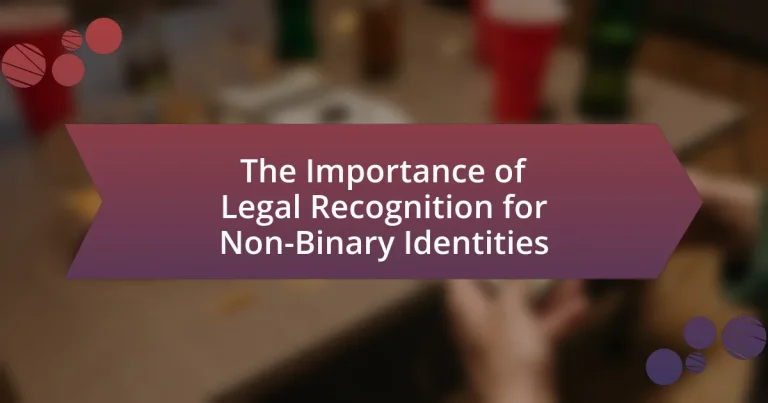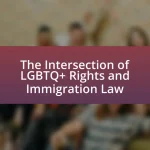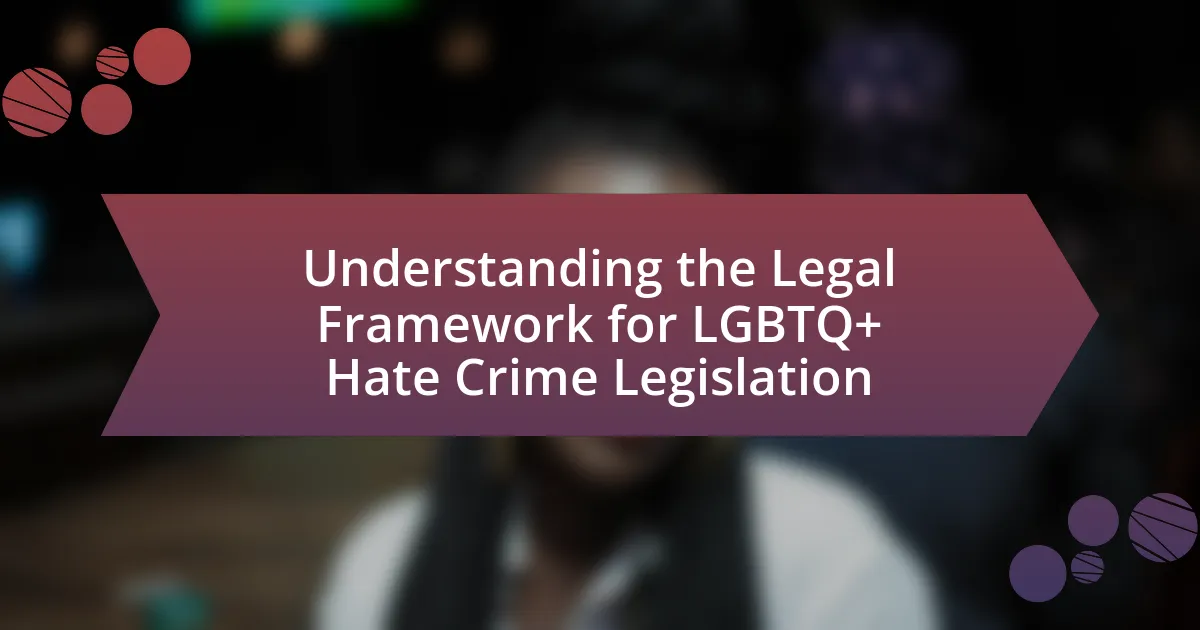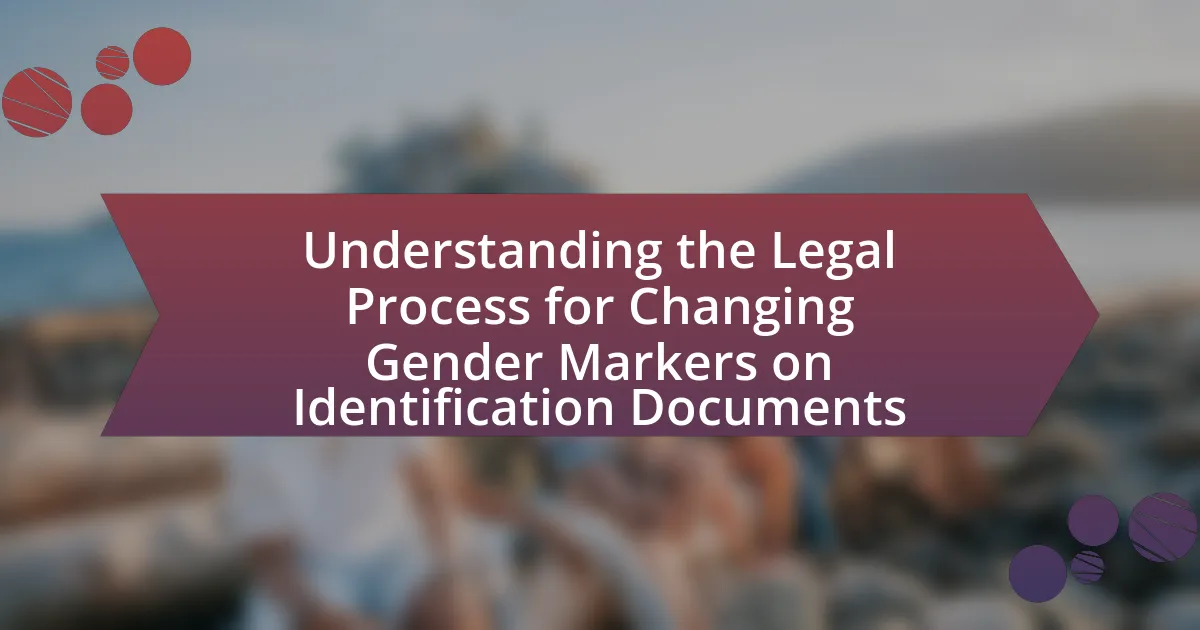Legal recognition for non-binary identities is essential for affirming individuals’ gender identities and ensuring equal rights and protections under the law. This recognition leads to improved mental health outcomes, greater access to healthcare and employment, and reduced discrimination. The article explores the psychological impacts of legal recognition, the challenges faced by non-binary individuals without such recognition, and the varying degrees of legal acknowledgment across different regions. It also highlights the role of societal perceptions and cultural attitudes in influencing legal frameworks, as well as strategies for advocating for the rights of non-binary individuals.
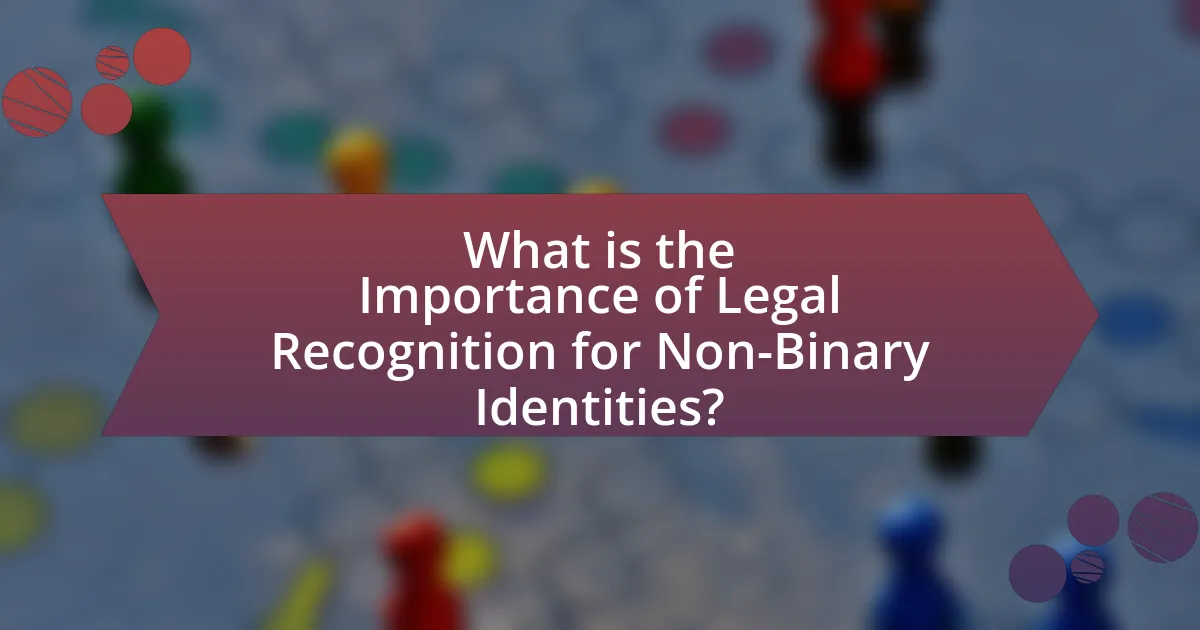
What is the Importance of Legal Recognition for Non-Binary Identities?
Legal recognition for non-binary identities is crucial as it affirms individuals’ gender identities and provides them with equal rights and protections under the law. This recognition can lead to improved mental health outcomes, as studies indicate that individuals who have their gender identity legally acknowledged experience lower rates of depression and anxiety. Furthermore, legal recognition facilitates access to essential services, such as healthcare and employment, by ensuring that non-binary individuals are not discriminated against based on their gender identity. For instance, countries that have implemented legal recognition for non-binary identities, such as Canada and Germany, have seen positive societal impacts, including increased visibility and acceptance of diverse gender identities.
Why is legal recognition crucial for non-binary individuals?
Legal recognition is crucial for non-binary individuals because it validates their identity and provides access to essential rights and protections. Without legal recognition, non-binary individuals face challenges such as discrimination, lack of access to healthcare, and difficulties in legal documentation, which can lead to social and economic marginalization. Studies show that legal recognition correlates with improved mental health outcomes and reduced rates of discrimination for non-binary individuals, highlighting the importance of inclusive policies that acknowledge diverse gender identities.
What are the psychological impacts of legal recognition on non-binary identities?
Legal recognition of non-binary identities significantly enhances psychological well-being by validating individuals’ gender identities and reducing feelings of marginalization. Studies indicate that legal recognition leads to improved mental health outcomes, including lower rates of anxiety and depression among non-binary individuals. For instance, research published in the Journal of Homosexuality found that individuals with legal recognition reported higher self-esteem and a greater sense of belonging. Furthermore, legal recognition can foster social acceptance, which is crucial for psychological resilience, as it allows non-binary individuals to navigate their identities without the burden of societal stigma.
How does legal recognition affect social acceptance of non-binary individuals?
Legal recognition significantly enhances the social acceptance of non-binary individuals by validating their identities within societal frameworks. When non-binary identities are legally recognized, it legitimizes their existence and fosters greater visibility, which can lead to increased understanding and acceptance among the general population. Research indicates that countries with legal recognition of non-binary genders, such as Canada and Germany, report higher levels of social acceptance and reduced discrimination against non-binary individuals. This correlation suggests that legal frameworks can influence societal attitudes, making acceptance more likely as legal recognition challenges traditional binary gender norms.
What challenges do non-binary individuals face without legal recognition?
Non-binary individuals face significant challenges without legal recognition, primarily including difficulties in accessing essential services and protections. Without legal recognition, non-binary individuals often encounter barriers in obtaining identification documents that reflect their gender identity, leading to issues in situations such as employment, healthcare, and legal matters. Research indicates that individuals with non-binary identities experience higher rates of discrimination and violence, which can be exacerbated by the lack of legal acknowledgment. For instance, a study by the Williams Institute found that non-binary individuals report experiencing discrimination in various settings, including workplaces and healthcare facilities, due to their gender identity not being recognized legally. This lack of recognition can also hinder their ability to advocate for their rights and access support systems, further marginalizing them in society.
How does the lack of legal recognition impact access to healthcare for non-binary individuals?
The lack of legal recognition significantly hinders access to healthcare for non-binary individuals by creating barriers in obtaining necessary medical services and support. Non-binary individuals often face discrimination and misunderstanding within healthcare systems that are primarily structured around binary gender identities. This can lead to inadequate care, as healthcare providers may not be trained to address the specific needs of non-binary patients, resulting in a reluctance to seek care. Furthermore, without legal recognition, non-binary individuals may encounter difficulties in insurance coverage, as many policies require identification that aligns with binary gender categories. Studies indicate that non-binary individuals report higher rates of mental health issues and lower access to healthcare services, highlighting the critical need for legal recognition to improve their healthcare experiences and outcomes.
What legal barriers do non-binary individuals encounter in everyday life?
Non-binary individuals encounter significant legal barriers in everyday life, primarily due to the lack of recognition of non-binary gender identities in many legal systems. Many jurisdictions only recognize binary gender categories, which complicates the ability of non-binary individuals to obtain identification documents that accurately reflect their gender, such as driver’s licenses and passports. For instance, in the United States, only a limited number of states allow for a non-binary option on identification documents, which can lead to issues in situations requiring ID verification, such as travel or employment. Furthermore, non-binary individuals may face discrimination in legal contexts, such as healthcare and employment, where policies often default to binary gender norms, thereby marginalizing their identities and limiting their access to services.
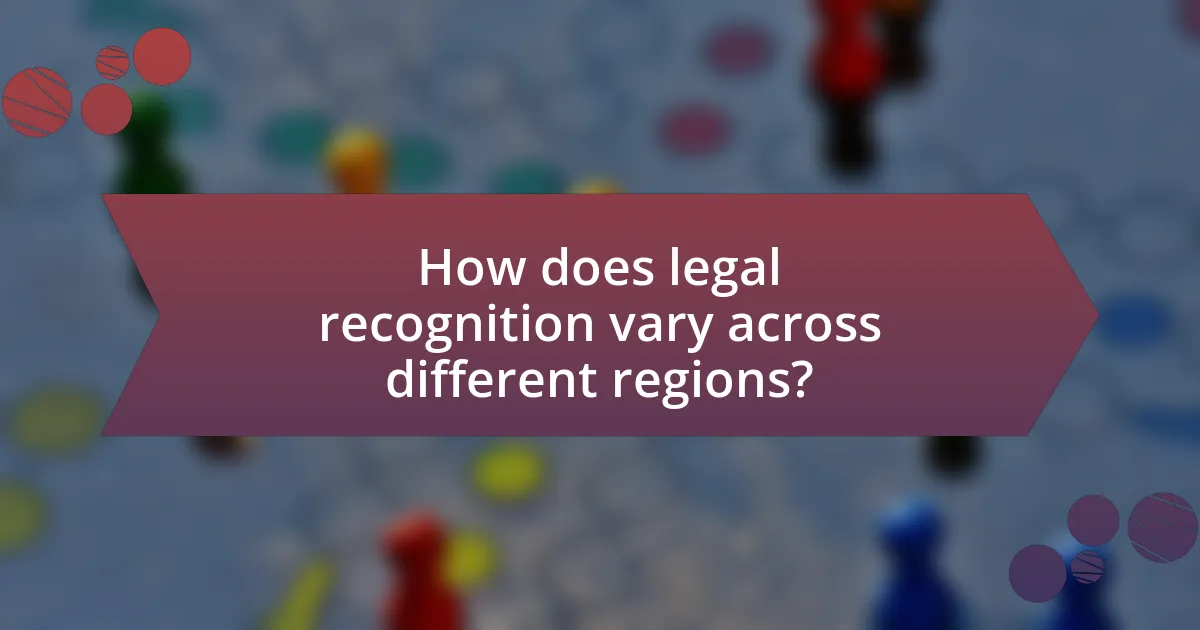
How does legal recognition vary across different regions?
Legal recognition of non-binary identities varies significantly across different regions, with some areas offering comprehensive legal frameworks while others provide minimal or no recognition. For instance, countries like Canada and Germany legally recognize non-binary gender options on official documents, allowing individuals to select a gender marker beyond male or female. In contrast, many regions in the United States have inconsistent policies, with some states allowing non-binary identification while others do not recognize it at all. Furthermore, in parts of Asia and Africa, legal recognition is often limited or non-existent, reflecting cultural and societal attitudes towards gender diversity. This disparity highlights the influence of local laws, cultural norms, and advocacy efforts on the legal status of non-binary identities.
What are the differences in legal recognition for non-binary identities globally?
Legal recognition for non-binary identities varies significantly across the globe, with some countries offering legal acknowledgment through gender-neutral options on identification documents, while others do not recognize non-binary identities at all. For instance, countries like Canada and Australia allow individuals to select a non-binary option on passports and other official documents, reflecting a growing acceptance of diverse gender identities. In contrast, nations such as Saudi Arabia and many parts of Africa maintain strict binary gender classifications, denying legal recognition to non-binary individuals. Furthermore, some countries, like Germany and New Zealand, have implemented legal frameworks that recognize non-binary identities, allowing individuals to register as “diverse” or similar terms. This disparity in legal recognition impacts the rights and social acceptance of non-binary individuals, influencing their access to healthcare, legal protections, and social services.
Which countries have made significant strides in recognizing non-binary identities?
Countries that have made significant strides in recognizing non-binary identities include Canada, Germany, and Australia. Canada introduced a third gender option on passports in 2017, allowing individuals to identify as “X” instead of “M” or “F.” Germany recognized a third gender option in 2018, permitting parents to register their children as “diverse” on birth certificates. Australia has also implemented a non-binary option for gender on passports since 2020, reflecting a growing acknowledgment of non-binary identities in legal frameworks.
What regions still lack legal recognition for non-binary individuals?
Regions that still lack legal recognition for non-binary individuals include many countries in Africa, the Middle East, and parts of Asia. For instance, nations such as Saudi Arabia, Egypt, and Uganda do not legally recognize non-binary identities, often enforcing binary gender classifications. Additionally, in many states within the United States, legal recognition for non-binary individuals is limited or non-existent, as laws vary significantly by state. This lack of recognition can lead to significant challenges for non-binary individuals in areas such as documentation, healthcare, and social acceptance.
How do cultural attitudes influence legal recognition of non-binary identities?
Cultural attitudes significantly influence the legal recognition of non-binary identities by shaping societal norms and values that policymakers consider when drafting legislation. For instance, in countries where acceptance of non-binary identities is prevalent, such as Canada and Germany, legal frameworks have been established to recognize non-binary gender markers on official documents, reflecting a broader societal understanding of gender diversity. Conversely, in cultures with rigid binary gender norms, legal recognition remains limited, as seen in many regions of the United States, where non-binary identities often lack formal acknowledgment in state laws. This disparity illustrates how cultural perceptions directly impact the legislative process and the extent to which non-binary individuals can access rights and protections.
What role does societal perception play in the legal recognition process?
Societal perception significantly influences the legal recognition process by shaping public attitudes and policy decisions regarding non-binary identities. When society views non-binary identities positively, it often leads to increased advocacy for legal reforms, resulting in more inclusive laws and recognition. For instance, countries that have embraced gender diversity, such as Canada and Germany, have implemented legal frameworks that acknowledge non-binary identities, reflecting a shift in societal attitudes. Conversely, negative societal perceptions can hinder progress, leading to resistance against legal recognition and perpetuating discrimination. This dynamic illustrates that societal perception is a critical factor in determining the extent and speed of legal recognition for non-binary individuals.
How can cultural shifts lead to improved legal recognition for non-binary individuals?
Cultural shifts can lead to improved legal recognition for non-binary individuals by fostering greater societal acceptance and understanding of diverse gender identities. As public awareness increases through education, media representation, and advocacy, lawmakers are more likely to respond to the evolving perceptions of gender. For instance, countries like Canada and Germany have enacted legal changes to recognize non-binary identities, reflecting shifts in cultural attitudes. Research indicates that as acceptance of non-binary identities grows, there is a corresponding increase in legislative efforts to provide legal protections and recognition, such as the introduction of gender-neutral options on identification documents. This correlation demonstrates that cultural shifts directly influence the legal landscape for non-binary individuals.
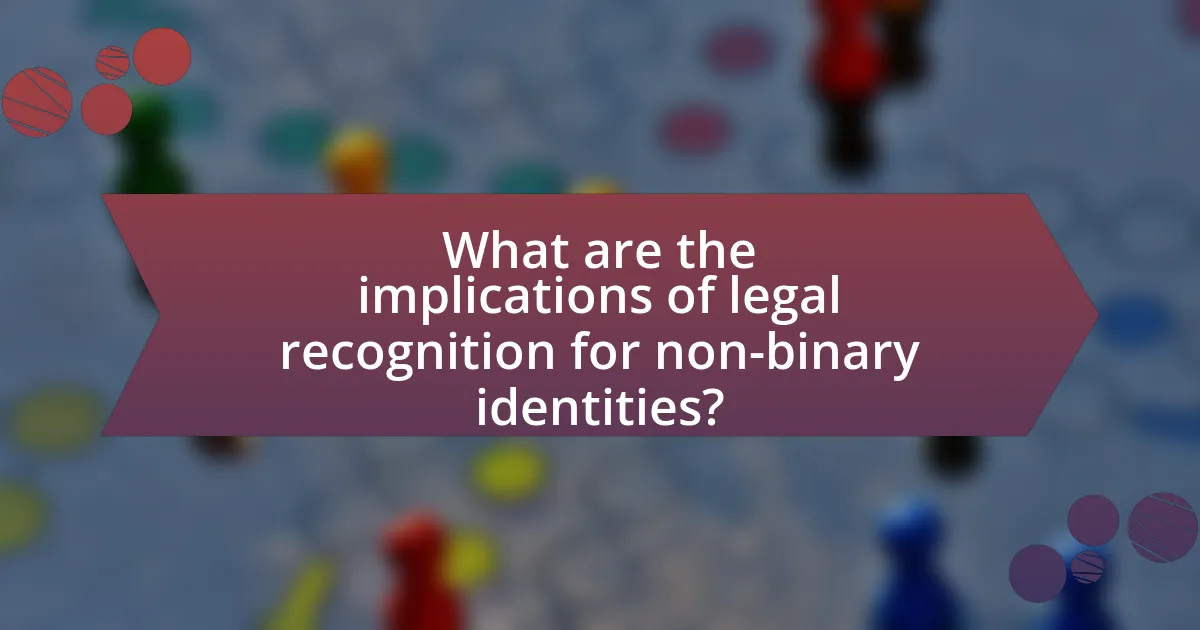
What are the implications of legal recognition for non-binary identities?
Legal recognition for non-binary identities leads to increased visibility, rights, and protections for individuals who do not identify strictly as male or female. This recognition can result in legal documents, such as identification cards and passports, reflecting non-binary gender markers, which affirms their identity and reduces discrimination. Studies indicate that legal recognition can improve mental health outcomes for non-binary individuals by validating their experiences and reducing stigma, as evidenced by research from the Williams Institute, which found that legal recognition correlates with lower rates of anxiety and depression among gender-diverse populations.
How does legal recognition impact the rights of non-binary individuals?
Legal recognition significantly enhances the rights of non-binary individuals by providing them with legal acknowledgment of their gender identity. This recognition allows non-binary individuals to access essential rights and protections, such as the ability to change their legal name and gender marker on identification documents, which is crucial for their social and legal acceptance. For instance, countries like Canada and Germany have implemented policies that allow individuals to select a non-binary option on official documents, thereby affirming their identity and reducing discrimination. Studies indicate that legal recognition correlates with improved mental health outcomes and social acceptance for non-binary individuals, highlighting the importance of such recognition in fostering equality and reducing stigma.
What specific rights are enhanced through legal recognition?
Legal recognition enhances specific rights such as the right to self-identify, access to appropriate healthcare, and protection against discrimination. These rights are crucial for non-binary individuals, as legal recognition allows them to have their gender identity acknowledged in official documents, which can lead to improved mental health outcomes and social acceptance. Studies show that individuals with legal recognition of their gender identity experience lower rates of anxiety and depression, highlighting the importance of these rights in fostering well-being and equality.
How does legal recognition influence non-binary individuals’ participation in society?
Legal recognition significantly enhances non-binary individuals’ participation in society by validating their identities and providing access to rights and protections. When non-binary identities are legally recognized, individuals experience increased social acceptance, which can lead to greater involvement in various societal activities, such as employment, healthcare, and education. For instance, a study by the Williams Institute found that legal recognition correlates with improved mental health outcomes and reduced discrimination, thereby fostering a more inclusive environment. This legal acknowledgment not only affirms non-binary individuals’ existence but also empowers them to engage more fully in their communities, contributing to a more diverse and equitable society.
What can be done to advocate for legal recognition of non-binary identities?
To advocate for legal recognition of non-binary identities, individuals and organizations can engage in lobbying efforts to influence policymakers and legislators. This includes drafting and promoting legislation that explicitly recognizes non-binary gender identities in legal documents, such as identification cards and birth certificates. For instance, countries like Canada and Australia have implemented policies that allow for a third gender option on official documents, demonstrating successful advocacy efforts. Additionally, raising public awareness through campaigns and educational initiatives can help shift societal perceptions, making legal recognition more attainable. Research indicates that legal recognition contributes to the mental well-being of non-binary individuals, as evidenced by studies showing reduced rates of discrimination and improved access to healthcare when gender identity is acknowledged legally.
What strategies can individuals employ to promote legal recognition?
Individuals can promote legal recognition for non-binary identities by advocating for inclusive legislation, engaging in public awareness campaigns, and collaborating with LGBTQ+ organizations. Advocating for inclusive legislation involves lobbying for changes in laws that recognize non-binary identities, such as gender-neutral options on identification documents. Public awareness campaigns can educate society about non-binary identities, fostering understanding and acceptance, which can influence policymakers. Collaborating with LGBTQ+ organizations can amplify efforts, as these groups often have established networks and resources to support legal recognition initiatives. For instance, the Human Rights Campaign has successfully influenced legal changes in various jurisdictions, demonstrating the effectiveness of organized advocacy.
How can organizations support the legal recognition of non-binary identities?
Organizations can support the legal recognition of non-binary identities by advocating for inclusive policies and legislation that acknowledge non-binary gender options on official documents. This includes lobbying for changes in laws that currently only recognize binary gender categories, such as male and female, and promoting the adoption of gender-neutral identifiers in government records. For instance, in 2021, the U.S. State Department introduced a gender-neutral option for passports, reflecting a growing recognition of non-binary identities. Additionally, organizations can provide resources and training to educate staff and the public about non-binary issues, fostering an environment that respects and affirms diverse gender identities.
What are best practices for supporting non-binary individuals in legal contexts?
Best practices for supporting non-binary individuals in legal contexts include using inclusive language, respecting chosen names and pronouns, and ensuring access to legal documentation that reflects their gender identity. Inclusive language fosters an environment of respect and understanding, while respecting chosen names and pronouns is essential for affirming an individual’s identity, as studies show that recognition of one’s identity significantly impacts mental health and well-being. Additionally, providing access to legal documentation, such as gender-neutral options on forms and the ability to change gender markers on identification, is crucial for legal recognition and protection, as it aligns with the principles of equality and non-discrimination outlined in various human rights frameworks.
